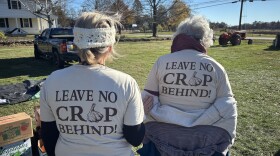Behind a cracked parking lot and below a yellowed sign sits the Hill Village Store. It’s right off the single road that cuts through Hill, New Hampshire, and it's the only store in town that sells food.
This week, after 17 years under one owner, it's closing and going up for sale. For Foodstuffs, our regular look at food and food culture in New Hampshire, NHPR’s Ben Henry went to Hill to find out what the loss of the store means for the town.
Inside the store, Gary Fouts rests on a milk crate behind the counter. “Well, it’s just a small general store, convenience store. The usual stuff. Beer, cigarettes, candy, soda. And there’s Glen. What’s goin on Glen?” Glen Bartis is a longtime friend of Fouts.
In a town with almost no other businesses, the store is the only place to hang out. The subs and pizza make it a popular lunch option. It’s the spot with a picnic table to sit around and smoke, the place where community cookouts happen. Bartis is a regular. “Everyone’s a regular around here," he says, "unless you’re passing through.”
But the store has been losing money for years, and a few weeks ago Fouts told folks he’s shutting down. Without the store, picking up a pint of milk will mean heading to a Hannafords in a neighboring town.
Bartis met Fouts back in 2002 and for a while lived in a building Fouts owned. “His time is past, I think, and he knows that, but he’s been an inspiration. If I ever needed anything special, he was there for me.”
For Fouts, trouble began in 2008, with the recession. Then, four years later, the town’s gas station closed. “That was the last nail in my coffin," he says. The gas station was a big source of foot traffic for him. “If [customers] stop for gas, they come over here to get stuff. Especially the people here in town—they don’t have to leave town. Once they started leaving town for gas, they’d get their other stuff there. Which makes sense.”
Some residents see the store closing as another signpost on the road to economic decline. But it’s not clear what a town should do in this situation.
A group of guys sitting at the picnic bench out front say the town needs to lower taxes—that they’re too high, and that’s why families don’t move here. “When I was a kid in town there was a lot of families in town with children, now there’s not," one customer observes. "A family with children, you just can’t afford to stay here.”
Some of that tax money goes to the grade school here. “That school is, they should close it, but there’s people on the school board who just refuse to listen to common sense.”
Shelly Henry, the town clerk, sees the matter differently. She grew up here too, and she agrees the taxes are high. But if the town is going to grow, it needs to spend money to encourage families to move here, she says. “We have seen house sales continue to grow, and we have seen some young families move into town.”
Back at the store, a few boys come in to buy sodas. Fouts has watched kids in the town grow up from behind the counter for years. On a back wall, next to two liter sodas, a row of photographs shows young men in military uniforms.
“This is my grandson, and the rest of these guys I met when they were three or four years old. That’s the neatest thing, I think, about having a place like this is being here so long and watching people grow up. You watch em get born, you watch em grow up, watch em get married, have kids, and die. It’s weird. It’s a cycle, it’s a circle.”
Fouts is not leaving Hill. He’ll be here to watch these boys now drinking sodas out front grow up.
“But like I say, when I was a little kid, my father used to tell me all the time, you got to know when the party’s over. The party’s over, for me. Somebody else will get it, somebody will probably do better.”
For what it's worth, he is looking forward to retiring and no longer working seven days a week. “I want to go on the Conway scenic railroad. I haven’t done anything in a long time. Get to know my wife again."
The store will go up for auction on July 10th. Fouts says he won’t be there--he doesn’t want to see it sold.








